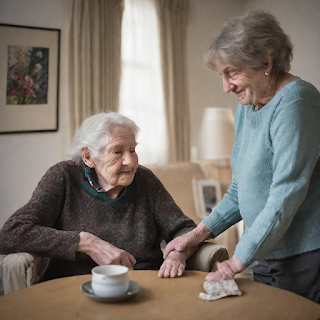Being a Primary Carer for a Relative with Alzheimer’s Disease – The Long Goodbye
Being a Primary Carer for a Relative with Alzheimer’s Disease – The Long Goodbye
In this series, Stephen Morgan shares his experience as a primary carer for his elderly mother, who is suffering from advanced Alzheimer's disease. Alzheimer's is a cruel disease that robs individuals of their dignity and independence when they need it most. With over 750,000 people in the UK and 4.5 million in the US affected by Alzheimer's, the disease's impact is significant. While there is no cure, research shows that effective care and support can improve the quality of life for both individuals and their caregivers. The challenges of caring for someone with Alzheimer's are unique to each person, and caregivers must stay informed, share concerns, solve problems one at a time, use their imagination, create a supportive environment, and avoid social isolation.
As a primary carer for my elderly mother, who is suffering from advanced Alzheimer's disease, I write this article to share my experience and insights. Alzheimer's is a devastating disease that strips individuals of their dignity and independence when they need it most.
In the UK, the Alzheimer's Society reports that over 750,000 people are affected by Alzheimer's and related dementia problems. In the US, this number has doubled since 1980, with an estimated 4.5 million people currently suffering from Alzheimer's. Shockingly, projections suggest that the number of Alzheimer's sufferers in the US could exceed 11.5 to 13 million by 2050.
Alzheimer's is a progressive brain disorder that gradually destroys memory, learning ability, reasoning, judgment, communication, and daily activities. It also affects personality, leading to behavioral changes such as anxiety, agitation, suspicion, delusions, and hallucinations.
While there is currently no cure for Alzheimer's, ongoing research offers hope for new treatments. Effective care and support can significantly improve the quality of life for both individuals with Alzheimer's and their caregivers.
It is a bittersweet irony that caregivers often suffer more than the individuals they care for. This fact is reflected in a recent survey, which found that Americans are equally afraid of caring for someone with Alzheimer's as they are of developing the disease themselves. Approximately half of American adults express apprehension about caring for a loved one with Alzheimer's, while less than 20% fear getting the disease themselves.
One of the challenges of caring for someone with Alzheimer's is that each person experiences the disease differently. Therefore, there is no one-size-fits-all approach to caregiving. Responsibilities can range from making financial decisions to managing changes in behavior and assisting with daily tasks like dressing.
Caring for someone with Alzheimer's is incredibly demanding, time-consuming, and stressful. Here are some strategies that can help caregivers support individuals with Alzheimer's while also reducing their own burden:
1. Stay informed: Knowledge is power. Learn as much as possible about Alzheimer's and dementia to better prepare yourself for the challenges that may arise.
2. Share concerns: Involve the person with mild to moderate impairment in their own care. Collaborate on memory aids and strategies. However, be aware that denial may be present, and adjust your approach accordingly.
3. Solve problems one at a time: Break down overwhelming problems into manageable tasks. Remember, success comes by taking small steps.
4. Use your imagination: Adaptability is key when dealing with Alzheimer's. If one approach doesn't work, try another. For example, if the person struggles with utensils, offer finger foods instead.
5. Create a supportive environment: Establish a stable schedule for meals and medication, while also encouraging activities the person can handle, such as walks or visits with friends. Remember to prioritize your own needs and find time for yourself.
6. Avoid social isolation: Maintain connections with friends and relatives. Seek support from organizations like the Alzheimer's Association and join support groups to connect with others facing similar challenges.
Caring for someone with Alzheimer's is a journey filled with ups and downs. By implementing these strategies, caregivers can provide the necessary support for their loved ones while also taking care of their own well-being.
Keywords: Alzheimer's, Alzheimer's Disease, Dementia, Carer, Caring, Primary Carer
